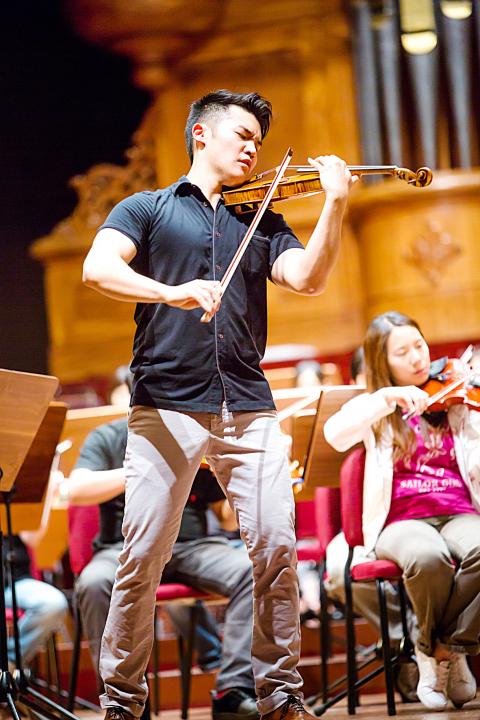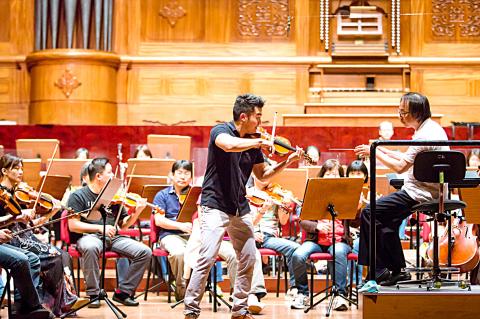At the National Concert Hall, the National Symphony Orchestra’s invited soloist has taken the stage. It’s a young man who, violin tucked under the chin, is hitting some show-stopping high notes in a difficult concerto. At full tilt, he looks almost hypnotized. He also appears to be in good form, literally — his muscles flex impressively and his slicked-back hair is an alluring hue, made up of all the shades of the dark side of the moon.
This is Ray Chen (陳銳), 25, a former prodigy who has become one of the classical music industry’s brightest virtuosos.
In 2008, he won the Yehudi Menuhin Competition, followed by the Queen Elisabeth Competition the next year. Since graduating from the Curtis Institute of Music in Philadelphia in 2010, he has recorded regularly, most recently an all-Mozart album with the great German conductor Christoph Eschenbach. He also performs at sold-out concerts across the globe, as a professional, touring classical violinist.

Photo courtesy of NTCH
But Chen is also not the traditional touring classical violinist. Compared to most icons of this industry, his image is fresh and quite diverse. He Tweets avidly, under the tagline “Musician. Violinist. Amateur Fashionista. Gourmet Food Hunter.” Online and off, he sings the songs of many brands: Gatsby hair products, Fiat automakers, Armani, the Cleo Restaurant in West Hollywood.
“Not too sure how fellow violinist Joshua Bell keeps his boyish looks at his current age of 45,” he writes on his blog. “Must be all the Clinique and Biotherm skin-care products working hard on keeping up that elasticity!”
GOING CORPORATE

Photo courtesy of NTCH
Chen doesn’t bother to downplay his corporate sponsorships, trumpeting them instead with a zeal that gives old-school classical audiences a double take. He says he loves most aspects of life as a touring violinist, from the sponsors to wardrobes to the parties to the hotel rooms.
“Initially violin was just for fun, but when I was eight, I was invited to Nagano Winter Olympics in Japan, to play in the opening ceremony,” he says.
“It showed me the happiness of being a touring violinist — taking planes, eating new foods, meeting new people. I fell in love with that new experience.”
Born in Taipei, Chen immigrated to Australia as an infant with his parents. At three years old, he was handed a toy guitar that he tucked under his chin and tried to play with a chopstick. When his parents noticed, they signed him up for violin lessons, but didn’t expect much to come from it, he says. It was Chen who wanted to go professional.
“In my house, it was very free. We could choose what we wanted to do,” he says.
“My mother supported me. When I didn’t want to practice, she said, ‘Oh. All right, then don’t.’ I would think, ‘Really?’ and would go back to practicing.”
Now, at 25, he is an established classical musician who is getting interested in genre crossover. Last year, he attended Milan Fashion Week under the wing of Georgio Armani and showed up smartly attired, armed with a violin for a backstage concert. Next year with Israeli mandolinist Avi Avital, he will begin a new fusion project to blend Bach, Chinese folk and klezmer, a Yiddish dance tradition. In the meantime, he’ll keep jetting across the globe on tour.
That’s his career, and for now, it is exactly the way he likes it.
In Taipei, he is rehearsing Tchaikovsky’s Violin Concerto in D Major, the breakout piece on which he won the Queen Elisabeth in 2009. He has performed it since he was 13 and revisited it over and over.
“The score is the same, but the way you look at it changes as you age,” he says. “The thing with classical music is you can always keep looking at it and seeing different things.”

Wooden houses wedged between concrete, crumbling brick facades with roofs gaping to the sky, and tiled art deco buildings down narrow alleyways: Taichung Central District’s (中區) aging architecture reveals both the allure and reality of the old downtown. From Indigenous settlement to capital under Qing Dynasty rule through to Japanese colonization, Taichung’s Central District holds a long and layered history. The bygone beauty of its streets once earned it the nickname “Little Kyoto.” Since the late eighties, however, the shifting of economic and government centers westward signaled a gradual decline in the area’s evolving fortunes. With the regeneration of the once

Even by the standards of Ukraine’s International Legion, which comprises volunteers from over 55 countries, Han has an unusual backstory. Born in Taichung, he grew up in Costa Rica — then one of Taiwan’s diplomatic allies — where a relative worked for the embassy. After attending an American international high school in San Jose, Costa Rica’s capital, Han — who prefers to use only his given name for OPSEC (operations security) reasons — moved to the US in his teens. He attended Penn State University before returning to Taiwan to work in the semiconductor industry in Kaohsiung, where he

On May 2, Chinese Nationalist Party (KMT) Chairman Eric Chu (朱立倫), at a meeting in support of Taipei city councilors at party headquarters, compared President William Lai (賴清德) to Hitler. Chu claimed that unlike any other democracy worldwide in history, no other leader was rooting out opposing parties like Lai and the Democratic Progressive Party (DPP). That his statements are wildly inaccurate was not the point. It was a rallying cry, not a history lesson. This was intentional to provoke the international diplomatic community into a response, which was promptly provided. Both the German and Israeli offices issued statements on Facebook

Perched on Thailand’s border with Myanmar, Arunothai is a dusty crossroads town, a nowheresville that could be the setting of some Southeast Asian spaghetti Western. Its main street is the final, dead-end section of the two-lane highway from Chiang Mai, Thailand’s second largest city 120kms south, and the heart of the kingdom’s mountainous north. At the town boundary, a Chinese-style arch capped with dragons also bears Thai script declaring fealty to Bangkok’s royal family: “Long live the King!” Further on, Chinese lanterns line the main street, and on the hillsides, courtyard homes sit among warrens of narrow, winding alleyways and